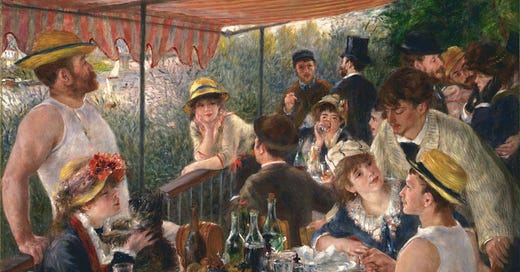Renoir and Custard
School lunch, despair, hope and Le déjeuner des canotiers, and a recipe for tomatoes on toast
A large, poor-quality print of Renoir’s Luncheon of the Boating Party (Le déjeuner des canotiers) hung in the dining room of Stover, the third-rate private school I attended between the age of nine and thirteen. I would have looked at it at least once a (school) day for these four years – hundreds of times. Renoir’s painting captures the sleepy energy o…
Keep reading with a 7-day free trial
Subscribe to Greed to keep reading this post and get 7 days of free access to the full post archives.



